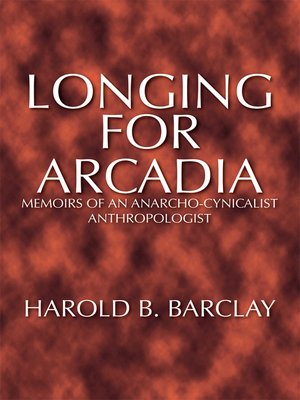
Sign up to save your library
With an OverDrive account, you can save your favorite libraries for at-a-glance information about availability. Find out more about OverDrive accounts.
Find this title in Libby, the library reading app by OverDrive.



Search for a digital library with this title
Title found at these libraries:
| Library Name | Distance |
|---|---|
| Loading... |
Longing for Arcadia expresses the life long hope and largely unsuccessful search of the author
for a tranquil, free and rural land. First, he discovered agriculture, which was not the answer. Then anarchism
seemed to be the resolution of the matter. This was the anarchist society built upon mutual aid and
voluntary cooperation. Soon, he confessed that while the anarchist critique of society was the most convincing of all,
the chances of achieving and maintaining such a society were unlikely. Next he encountered anthropology
and made it his life career. While anthropology was also inadequate, he felt at least it served as a
bulwark against ethnocentrism and it unveiled the immense variety of human cultures, demonstrating that
such entities as capitalism and government did not need to be inevitable and immutable elements of all human
society.
His widespread world travels initially put him in Egypt and the Sudan, where for more than three
years he taught and did field studies of the contemporary population. For over thirty years the author
taught at universities in the United States and Canada. During this time he undertook numerous journeys, especially
especially through Europe and the Middle East, wrote several books and raised a family. Retired from the
University of Alberta in 1989, he eventually moved to Vernon, British Columbia, where he continues to write,
to garden and to ride his old horse, Coral.
Scattered throughout the book are numerous observations and provocative comments on a multitude of
topics, including philosophy, religion, politics, economics, social organization and agriculture.
The author has dubbed himself and anarcho-cynicalist in part after the ancient Cynics, who undertook
a radical critique of society and seemed to be advocating something like a fee or anarchist society.







